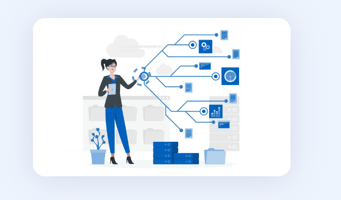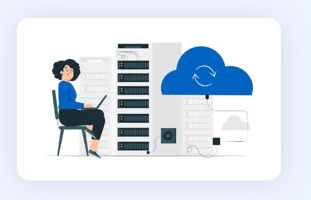Introduction In today's fast-paced digital landscape, businesses are constantly seeking innovative...
7 Key Strategies for Successful eLearning App Development
Introduction:
In today's fast-paced digital world, eLearning has become increasingly popular, revolutionizing the way we acquire knowledge and skills. As the demand for flexible and accessible learning solutions continues to rise, the importance of developing high-quality eLearning apps cannot be overstated. Whether you're an educational institution, corporate trainer, or independent developer, understanding the key strategies for successful eLearning app development is essential for staying ahead in this competitive landscape.
Understanding the eLearning Landscape
In this section, we'll delve into the current state of eLearning and the opportunities it presents for app developers.
The eLearning market has experienced exponential growth in recent years, driven by factors such as technological advancements, increasing internet penetration, and the growing adoption of remote learning solutions. With the global eLearning market projected to reach $375 billion by 2026, according to a report by Global Market Insights, the potential for eLearning app developers is immense.
Identifying User Needs and Requirements
To create a successful eLearning app, it's crucial to understand the needs and requirements of your target audience. By conducting thorough market research and user surveys, you can gain valuable insights into the preferences and pain points of learners.
Harnessing Innovative Technologies
Incorporating innovative technologies such as artificial intelligence (AI), augmented reality (AR), and machine learning (ML) can significantly enhance the user experience and effectiveness of eLearning apps.
Designing Intuitive User Interfaces
A user-friendly interface is paramount for engaging learners and facilitating seamless navigation. Focus on designing intuitive layouts, clear navigation menus, and interactive elements to enhance usability.
Creating Engaging Content
Content is king in eLearning, and creating engaging and interactive learning materials is essential for keeping users motivated and invested in the learning process. Incorporate multimedia elements, gamification features, and real-world scenarios to make learning fun and engaging.
Ensuring Scalability and Flexibility
Scalability and flexibility are key considerations in eLearning app development, especially as the user base grows and technology evolves. Build a robust backend infrastructure and leverage cloud computing solutions to ensure smooth scalability and adaptability to changing needs.
Implementing Robust Security Measures
With the increasing threat of cyber attacks and data breaches, ensuring the security of eLearning apps is paramount. Implement robust encryption protocols, secure authentication mechanisms, and regular security audits to safeguard user data and maintain user trust.
Leveraging Data Analytics for Personalization
Data analytics plays a crucial role in eLearning app development, enabling developers to track user behavior, measure learning outcomes, and personalize the learning experience. Leverage advanced analytics tools to gain actionable insights and optimize your app for maximum impact.
FAQs
How long does it take to develop an eLearning app? The development timeline for an eLearning app can vary depending on various factors such as the complexity of the app, desired features, and development approach. On average, it can take anywhere from a few months to a year to develop a fully functional eLearning app.
What are some essential features to include in an eLearning app? Some essential features to include in an eLearning app are user authentication, interactive course content, progress tracking, discussion forums, multimedia support, and assessment tools.
How can I monetize my eLearning app? There are several monetization strategies you can explore for your eLearning app, including subscription-based models, in-app purchases, advertisements, sponsorship deals, and selling premium content or courses.
What programming languages and technologies are commonly used in eLearning app development? Commonly used programming languages and technologies in eLearning app development include JavaScript, Python, Swift, Java, HTML5, CSS3, React Native, AngularJS, Node.js, MongoDB, and Firebase.
How can I ensure the success of my eLearning app? To ensure the success of your eLearning app, focus on understanding your target audience, creating high-quality content, providing excellent user experience, leveraging innovative technologies, and continually optimizing based on user feedback and data analytics.
What are some emerging trends in eLearning app development? Some emerging trends in eLearning app development include microlearning, adaptive learning, personalized learning paths, social learning features, virtual reality (VR) and augmented reality (AR) integration, and mobile-first design.
Conclusion:
In conclusion, successful eLearning app development requires a strategic approach, innovative thinking, and a deep understanding of user needs and preferences. By following the key strategies outlined in this guide and staying abreast of emerging trends and technologies, you can create engaging, effective, and scalable eLearning apps that empower learners and drive positive learning outcomes.


